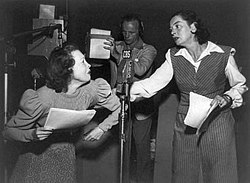Suspense (radio drama)

Lurene Tuttle (left) and Rosalind Russell in "The Sisters" on Suspense in 1948
|
|
| Genre | Drama and suspense |
|---|---|
| Running time | 30 minutes or one hour |
| Country | United States |
| Language(s) | English |
| Home station | CBS Radio Network |
| Written by |
|
| Directed by |
|
| Produced by |
|
| Air dates | June 17, 1942 to September 30, 1962 |
| No. of episodes | 946 |
Suspense is a radio drama series broadcast on CBS Radio from 1942 through 1962.
One of the premier drama programs of the Golden Age of Radio, was subtitled "radio's outstanding theater of thrills" and focused on suspense thriller-type scripts, usually featuring leading Hollywood actors of the era. Approximately 945 episodes were broadcast during its long run, and more than 900 still exist.
Suspense went through several major phases, characterized by different hosts, sponsors, and director/producers. Formula plot devices were followed for all but a handful of episodes: the protagonist was usually a normal person suddenly dropped into a threatening or bizarre situation; solutions were "withheld until the last possible second"; and evildoers were usually punished in the end.
In its early years, the program made only occasional forays into science fiction and fantasy. Notable exceptions include adaptations of Curt Siodmak's Donovan's Brain and H. P. Lovecraft's "The Dunwich Horror", but by the late 1950s, such material was regularly featured.
Alfred Hitchcock directed its audition show (for the CBS summer series Forecast). This was an adaptation of The Lodger a story Hitchcock had filmed in 1926 with Ivor Novello. Martin Grams Jr., author of Suspense: Twenty Years of Thrills and Chills, described the Forecast origin of Suspense:
On the second presentation of July 22, 1940, Forecast offered a mystery/horror show titled Suspense. With the co-operation of his producer, Walter Wanger, Alfred Hitchcock received the honor of directing his first radio show for the American public. The condition agreed upon for Hitchcock's appearance was that CBS make a pitch to the listening audience about his and Wanger's latest film, Foreign Correspondent. To add flavor to the deal, Wanger threw in Edmund Gwenn and Herbert Marshall as part of the package. All three men (including Hitch) would be seen in the upcoming film, which was due for a theatrical release the next month. Both Marshall and Hitchcock decided on the same story to bring to the airwaves, which happened to be a favorite of both of them: Marie Belloc Lowndes' "The Lodger". Alfred Hitchcock had filmed this story for Gainsborough in 1926, and since then it had remained as one of his favorites.
...
Wikipedia
